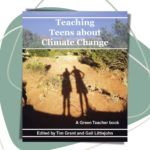Using Philosophy to Think Green

To view the photo-rich magazine version, click here.
Originally appears in the Winter 2018 issue.
Elementary-level learners are naturally curious about the world around them, as well as their place in it, which explains their enthusiasm for studies of ecology. Children are also natural philosophers, with a seemingly limitless supply of “Why” questions. Combining a popular and accessible subject like environmental studies with a child’s natural inclination to wax philosophical not only bolsters both areas of study, but can also lead to the development of thinking skills that are useful in any subject, as well as in a child’s personal life. Most importantly, with a little practice and preparation, even educators who don’t have previous experience in philosophy can nurture environmental philosophy in their classroom.
The first, and most practical reason for bringing philosophy into any subject area is that it’s a straightforward and engaging way to develop soft skills, such as critical thinking, communication, and problem-solving. Children learn how to think, instead of what to think, and they can do so by exploring big questions that pertain to the environment.
This content is restricted to subscribers only.
If you are not yet a subscriber, please consider taking out a subscription here.
If you are an existing subscriber, kindly log in or contact us at info@greenteacher.com for more information.










